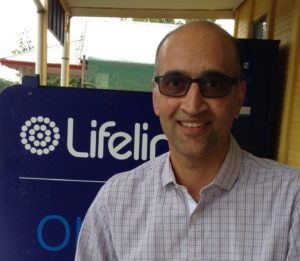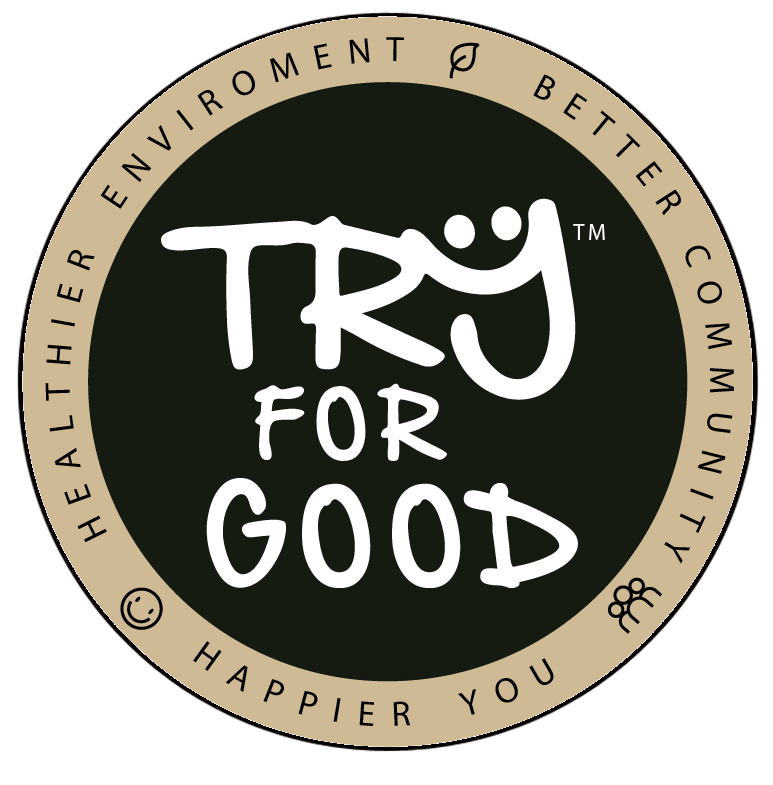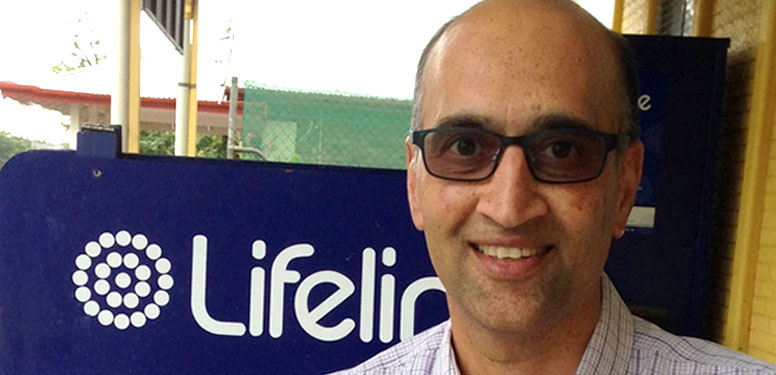Disability or any health disorder never comes alone. It does impact the emotional well-being of the challenged individual. People go for all sorts of treatment but tend to miss this significant therapy which can greatly improve overall health and motivation. The same applies for the family caregivers, who may be even bigger victims. Dr. Anju discusses deep psychological and behavioral complexities of the disabled and the family caregivers with Ruchir Sodhani, a professional counselor, and therapist with experience in Australia and India. Ruchir also counsels at Rukmani Birla Hospital, Jaipur.

Anju: Disability of any form is never a physical or mental challenge alone. It needs a more holistic approach to deal with it, including psychological counseling or life coaching. The concepts are apparently untouched in the Indian market. What is your take on that?
Ruchir: I agree that disability is not just a medical condition that impacts some part of our body. It can also result in a sense of intense loss, anger, isolation, overwhelmed, of not being understood, and being devoid of choices and hope. We may lose our sense of belonging and life can seem meaningless or burdensome. A holistic approach looks at diverse aspects including psychological, social, and spiritual.
Seeking professional advice for mental distress is new and infrequent in India. If one has a broken arm, no one questions going to a doctor; or for a broken car, going to a mechanic. But as for mental distress, there are huge cultural hurdles and social stigma associated with even admitting to feeling down and hopeless. Others may “instruct” you to “be strong”, “be positive”, or “have faith”. In this context, seeking help is definitely difficult. On the other hand, movies such as ‘Dear Zindagi’, media, and well-known public figures are helping to raise awareness of mental illness and to make it more acceptable to seek professional help. So, I reckon slowly but steadily we are getting there.
Sometimes having supportive, understanding and caring people around us is sufficient. But if life gets too stressful, emotions impact negatively, feel lonely, hopeless, or paralyzed in the face of problems; consulting a counselor can be helpful. Sharing and expressing is a vent, which if done with a professional should help bring clarity and exploring practical ways to manage distress, and rediscover our own strengths & confidence. We may regain a sense of comfort and learn to live a little lightly, getting a new meaning and purpose.
Anju: The toll on family caregivers is often unrecognized, especially by the challenged people or their visitors. This lack of empathy leads to frustration, self-pity, negativity all around in such families. Respite for caregivers should also come as a prescription, provided there is any help available (e.g. from extended family/ friends/ neighbors/ service providers).
Ruchir: So very true. The impact on caregivers is typically overlooked as all attention is on the patients or the disabled. They may be expected to be superhuman when it comes to giving support – whether it is physical, psychological, financial, or their time. Caregivers often have to curtail their employment, leisure, suppress their desires and interests; and yet when there is no acknowledgment, it can definitely have an adverse effect, especially in situations requiring long arduous care.
It would be wonderful if the concept of respite care is brought to the forefront. Similar to the way that working professionals take breaks for recreation or vacation to maintain balance and productivity. This is no different! It would be great to have a wider availability of respite care through government, NGO, the private sector, or support groups. Doctors and well-wishers could help by keeping a finger on the pulse of caregivers too and recommend and motivate them to take a break. We all, as a society, can offer some of our time to help friends and family in need.
This could lighten the load and lift spirits of many families.
Anju: More than the disease or the disability, it is often the diverse mindsets of the family members that generate complexity and hinder concurring on a solution. Especially, in the scenarios of the responsibilities being shared. This probably calls for family counseling with some outside intervention. Perhaps Indian communities need this breakthrough.
Ruchir: I agree that making decisions about treatment, care, and management of disease or disability is very complex. Firstly, options are not straight forward, and often there is an uncertainty about possible results, side-effects, costs, effort, and time. We ourselves may not be in the best state of mind to contemplate all factors. Moreover, it is important to be able to know what the patient wants or rejects both overall and specifically.
On top of this, if multiple people are involved, it is quite natural to have conflict. It is hard to even agree to outside intervention! An awareness of the nature of such problems can lead to a more considered and amicable approach. For example, firstly, we need to find some calm within ourselves. Then we can answer questions like “What would be a “good” or a “good enough” outcome for the patient? What beliefs and experience are driving my own choices or preferences? What are my fears about other choices? What are the risks and are we ready for them?
In fact, if we all share our concerns, fears, and acceptable outcomes, everyone involved can have insights into different choices. Of course, we have to be ready to listen to everyone else too. In doing so we may be able to make judgments about the choice, rather than about the proposed or their principles. And we may have less emotional turmoil all around!
Anju: The irony is also that the physically or mentally challenged people have too much time to feel the lull, while others are just running around with no spare time. Unfortunately, there are no Munnabhai MBBS role players or such organizations which send volunteers for “engaging” or “recreation” for such people or families. Any thoughts?
Ruchir: You have pointed out a big gap or opportunity for support organizations, whether they be self-help groups, community organizations, voluntary or even professional ones in the government, corporate, or NGO space. Much like aged care, we have the prospect of touching so many lives through support for social interaction, recreation, respite care, hobbies and interests, transport, have-a-chat, and so on.
Anju: Happiness is the key to stay healthy or improvise health. In your experience or learning, how should a disabled person or a patient deal with his battle to stay happy? How to help forgetful or depressed patients?
Ruchir: Often a disability or chronic illness gives a blow to our sense of who we are. There are parts of one’s own life and personality that we tend to forget or push into the background. It is important to “remember” these parts, especially parts that used to give us energy.
Patients need someone who is ready to listen patiently, understand their situation, show empathy, and be a source of regular support and motivation. Loneliness and isolation can be the key issue to add to the despair. It is important that we as a family or community members help them find “small joys” every day – it could be simple as spending time together over a cup of tea, listening to their favorite music, playing games, spiritual practice, or helping them get in touch with their friends or family. This can be a catalyst for patients to move away from being a victim to find new ways of being and doing.
Since everyone is unique, one has to respect the patient’s preferences and perspectives. We have to help them to find their own way for dealing with their situation. The path to regaining the sense of belonging, self-worth, and self-confidence may be slow and rocky. Seeking professional help can also be useful.
Anju: Likewise the caregivers? They have never-ending responsibilities. Their lives are halted; their expenses increase while incomes decrease. Above all, their mental and physical health starts getting impacted too! Also, at times they find it difficult to ask for help OR they may find it sinful to enjoy life when their family member is suffering. Your thoughts?
Ruchir: It is amazing how much caregivers do for disabled patients, every day. It is their sense of responsibility, love, caring, and their creativity and adaptability to deal with events and situations that allow them to continue supporting disabled patients.
The main issue is when caregiving becomes almost a full-time job. It can be draining, both physically and mentally, and the need to stay vigilant all the time can take its toll. Stress, lack of respite, and isolation are common issues that need to be managed. In the face of their responsibilities, they may be negligent or not prioritize their own needs, and deny or delay gratification for themselves. Just like an air-hostess advice us to put on our own seatbelt and oxygen mask first, understanding that “we cannot help others unless we ourselves stay healthy and happy” is key.
Respite and breaks, self-care, of engaging in enjoyable activities, fulfilling their own needs and desires is key to a caregiver’s mental and physical health. Reaching out for help from others is so important. Like everyone else, caregivers need to maintain relationships and contact with people with whom they can share; people who care for them and remind them of their being a “person” in their own right!
Anju: You were serving in IT industry. What made you switch to counseling?
Ruchir: I worked in the IT industry in India, US, and Australia for over 25 years, befriending many wonderful, bright, and passionate people across continents. After a close friend’s experienced mental illness, I changed tracks, completed a degree in Counselling, and found a new ‘avatar’ or calling as a professional counselor and therapist. I help clients manage a variety of issues ranging from emotional distress and feeling suicidal to being a sounding board during tough circumstances.

